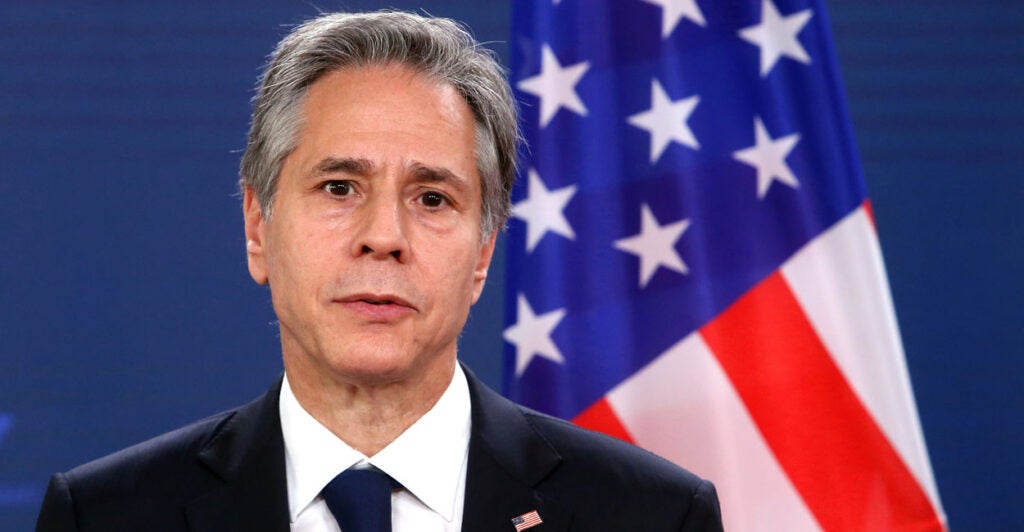Russia’s war on Ukraine makes the effort known as the Three Seas Initiative “even more urgent,” U.S. Secretary of State Antony Blinken said in a recent speech via video to a related summit meeting in Riga, Latvia.
The urgency is not only for the initiative’s member nations and partners, Blinken said during his June 24 remarks, but for its focus areas of energy, transportation, and digital communications.
Indeed, the issue of making the Three Seas Initiative, launched in 2015, more practically operational has gained greater urgency and necessity.
The Three Seas Initiative, also known as 3SI, is a joint regional effort in Central and Eastern Europe to expand cross-border energy, transportation, and digital infrastructure and boost economic development in the countries around the Adriatic Sea, Baltic Sea, and Black Sea.
The goal has been to implement a development initiative that would operate on commercial terms and redress the region’s chronic connectivity shortcomings.
Twelve countries, all members of the European Union, participate in the Three Seas Initiative along with the United States. They are Austria, Bulgaria, Croatia, the Czech Republic, Estonia, Hungary, Latvia, Lithuania, Poland, Romania, Slovakia, and Slovenia.
This year’s gathering at the Three Seas Initiative Summit and Business Forum in Latvia reaffirmed that the initiative still has potential to address transatlantic economic, energy, and security issues. Yet the combination of crosscutting challenges in the region and a lackluster commitment from Washington keeps the overall progress far slower and smaller than what many have hoped for.
At the summit, officials announced that the U.S. International Development Finance Corporation and the Three Seas Initiative Investment Fund had reached an agreement under which the U.S. agency will provide up to $300 million of financing to the investment fund.
According to the Development Finance Corporation, the investment strategy of the Three Seas Initiative Investment Fund would incorporate the agency’s “value-driven approach.” It would “focus on sustainable development as well as advancing environmental and social objectives,” and the Development Finance Corporation will play an important role.
However, if Washington and its transatlantic partners in the Three Seas Initiative genuinely are serious about the initiative, they should not turn it and its investment fund into another conduit for advancing an “environmental, social, and governance” agenda. Such an agenda often is called simply ESG—a buzzword both heavily circulated and rightfully debated for its legitimacy in the investment community.
From Washington’s foreign policy perspective, the Three Seas Initiative is one of the most notable political and economic policy initiatives to emerge in Central and Eastern Europe.
Fundamentally, 3SI is and should be a practical platform for private sector investors to initiate and pursue infrastructure development projects. The initiative’s success ultimately hinges on building private-public partnerships driven by concrete business interaction, not a feel-good political agenda such as ESG.
Tesla CEO Elon Musk bluntly described ESG as “a scam” that is “weaponized by phony social justice warriors.”
Indeed, under the tent of ESG activism, a good number of corporations around the globe have become woke. They have weaponized capital, promoting a left-wing policy agenda in the name of good, desirable, preferred investment.
The unfortunate yet perhaps not so surprising reality, though, is that the environmental, social, and governance agenda largely is failing to produce what it claims in terms of investment returns and positive impact.
In the current geopolitical context, building secure, robust supply chains and greater connectivity while ensuring resilient growth means shifting trade from adversarial regimes to dependable friends and partners. In addition to traditional trade relationships, the United States needs to offer credible, concrete alternatives to the Three Seas Initiative economies to combat malicious influence from adversarial powers.
However, ill-guided, shortsighted, politically driven policies such as ESG often result in a clear and present danger. And its people who seem to get lost in all of this.
For instance, consumers and producers across the United States and Europe are getting hurt from high energy prices that have been a result of bad choices about climate policy. Such policy should put people and their economic livelihoods first, but that hasn’t been the case.
From a broader yet critical perspective, it should be noted that economic freedom—not the environmental, social, and governance agenda—makes the world cleaner, safer, and better governed. It’s not hard to find the economic damage inflicted by heavy-handed and misguided government policies, which result in lingering uncertainty, deteriorating entrepreneurial environments, and lower employment growth.
The true path to ensuring environmental, social, and governance improvements lies in focusing on policies that enhance economic freedom. As documented in The Heritage Foundation’s annual Index of Economic Freedom, the linkage between economic freedom, liberty, and prosperity around the world is unambiguous.
Regardless of how the calamity in Ukraine plays out, it’s undeniably clear that Russia’s autocratic dominance as an energy source for most of Europe has given Moscow outsize political and economic leverage. Russia has weaponized its energy resources against many of America’s transatlantic allies and partners.
In facilitating much-needed, greater cooperation in energy and connectivity independent of Russia’s influence, the Three Seas Initiative can and should play a vital role. The effort must be enhanced accordingly, particularly with America’s becoming a more proactive anchor investor in the initiative.
The coming months likely will be the crucial period when America and its allies will decide whether the Three Seas Initiative remains just a diplomatic agenda driven and shaped by the Left’s environmental, social, and governance standards, or can become a serious, pragmatic project.
Have an opinion about this article? To sound off, please email letters@DailySignal.com and we’ll consider publishing your edited remarks in our regular “We Hear You” feature. Remember to include the url or headline of the article plus your name and town and/or state.
